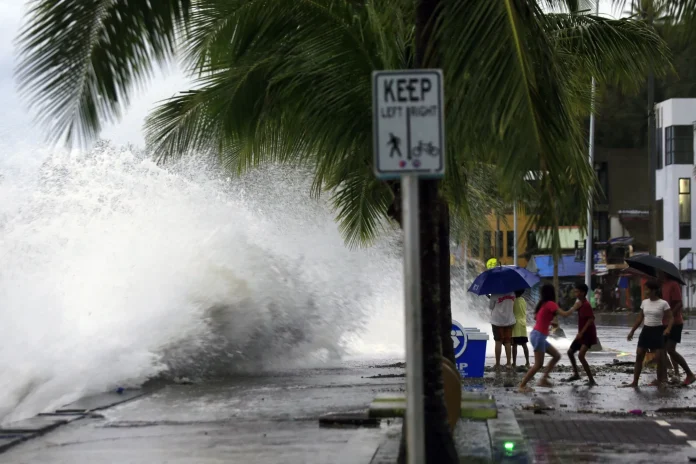India’s capital Delhi has ordered all schools to stop full-time classes until further notice due to growing pollution in the metropolis, as super Typhoon Man-yi, with maximum wind speeds of up to 185 kilometres per hour and gusts of up to 230 kilometres per hour, equivalent to a Category 3 hurricane, has hit the Philippines.
Typhoon Man-yi leaves seven dead in landslide in Philippines
Typhoon Man-yi killed at least seven people in a landslide, destroyed dozens of homes and displaced a large number of villagers before leaving the northern Philippines, worsening a crisis caused by several storms pitting each other against each other.
Man-yi was the sixth major storm to hit the weather-weary country in the past month.
The meteorological service said Man-yi was travelling at a maximum speed of 195 kilometres per hour, hitting the sparsely populated island province of Catanduanes as a super typhoon with gusts of up to 325 kilometres per hour.
A forecaster said waves up to 14 metres high hit the coast of Catanduanes, while Manila and other vulnerable coastal regions are at risk of storm surges of more than three metres over the next 48 hours.
At least 163 people have been killed in the five storms that hit the Philippines in recent weeks, leaving thousands homeless and destroying crops and livestock. The government has urged people to heed the warnings and flee to safety.
India’s capital shuts schools because of smog
Schools in India’s capital New Delhi switched to online classes on Monday due to worsening toxic smog, the latest attempt to ease the health crisis in the sprawling metropolis.
Levels of PM2.5 pollutants, dangerous cancer-causing microparticles that enter the bloodstream through the lungs, were recorded at 57 times the World Health Organisation’s recommended daily maximum on November 18.
At dawn on Monday, they were about 39 times the warning levels, and the city was blanketed in thick grey and acrid smog.
The city is blanketed by acrid smog every year, blamed mainly on farmers burning stubble in neighbouring regions to clear fields for ploughing, but also factories and exhaust fumes.
The restrictions were imposed by city officials “in an attempt to prevent further deterioration” of air quality. Authorities hope that by leaving children at home, traffic will be significantly reduced.
Many city residents cannot afford air filters, nor do they have homes they can effectively shield from the foul-smelling air blamed for thousands of premature deaths. New Delhi and the surrounding metropolitan region, home to more than 30 million people, consistently tops global rankings for air pollution in winter.
